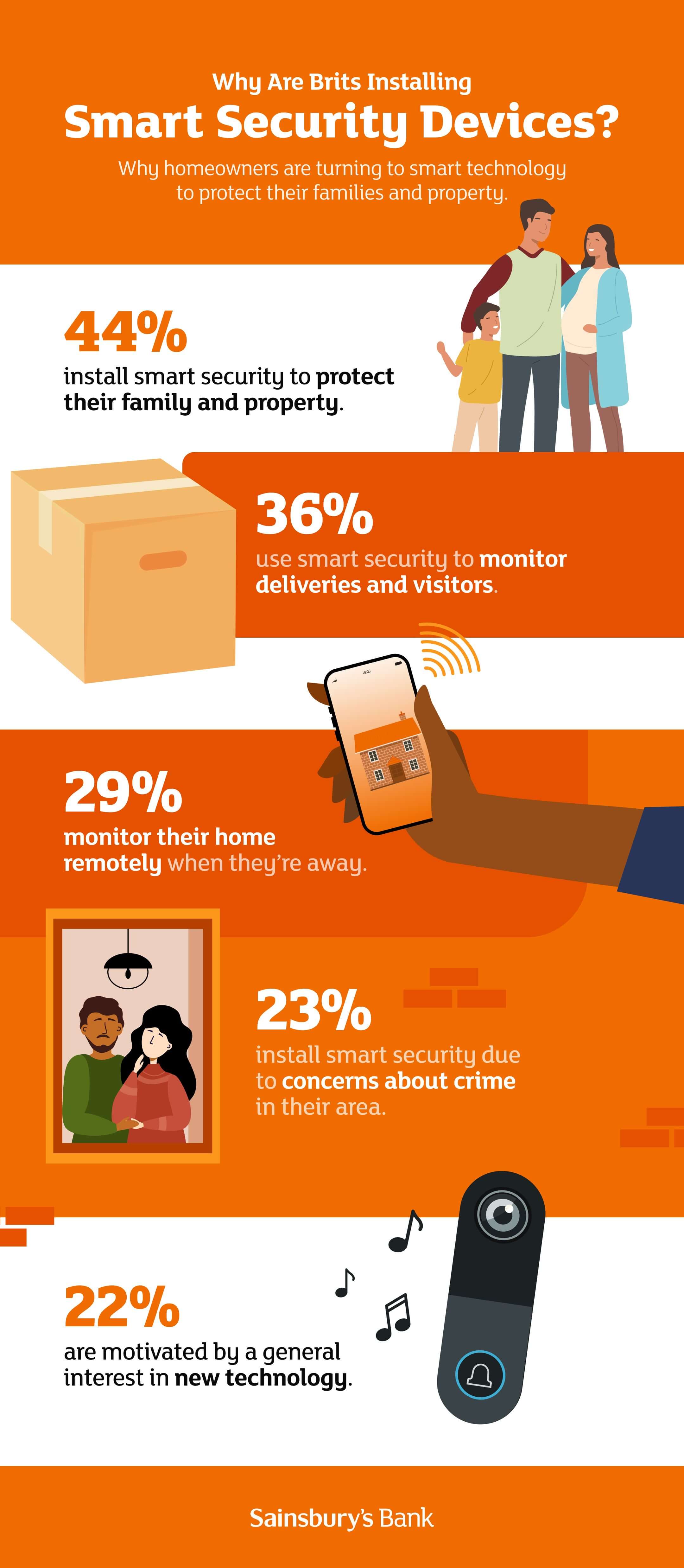Introduction: Security Concerns on the Rise
At Sainsbury’s Bank, we conducted a survey of 2,000 adults in the UK to find out if home security concerns are at the forefront of people’s minds, what solutions people are implementing, and what barriers there are to adopting security solutions. Here’s what we found.
We found that 57% of Brits are concerned about home security and 17% expressed significant worry, which shows that keeping your home safe and secure is top of mind for many households. Smart home security systems are growing in popularity, but 49% still don’t use them - highlighting room for increased adoption.
Smart Security Devices: Balancing Convenience and Cost
Almost half of respondents (48%) use at least one smart home security device such as smart doorbells, smart cameras and alarms. There are a range of reasons why people buy and install smart security systems, including protecting family and property (44%), monitoring deliveries (36%), and the convenience of remote access (29%) at the forefront of people’s minds. However, roughly a quarter of respondents were also concerned about crime in the area they live in.
Smart home security devices function well, with 92% of people who use smart devices finding them effective, with 33% rating them very effective. So, why is smart home security not being more commonly used?
The main barriers to adoption are:
- 41% cite high costs, meaning smart home security is out of many people’s budgets during the continued cost of living crisis.
- 31% didn’t feel the need for additional security.
- 27% rely on traditional security methods, such as dogs or traditional security alarms.
- 26% believed that living in a safe neighbourhood meant they didn’t require smart security devices to monitor their home.
- 21% are concerned about data security or their smart security systems being hacked.
- 20% admitted their lack of understanding of smart security devices was holding them back from adopting it.
This demonstrates that, while there are good reasons to use smart home security devices, they may not be a priority or possibility, for some would-be users. Likewise, the exact benefits or conveniences of these technologies may not be immediately apparent, compared to more traditional methods of security.

Community Vigilance: Strength in Numbers
When it comes to security and safety, there’s strength and comfort in community. Living alongside people you know and trust can contribute to peace of mind. But beyond that, an active neighbourhood can positively affect security and drive down crime risks. It’s not just about feeling safe – looking out for your neighbours can have tangible benefits.
When asked, 23% of respondents stated they have reported suspicious activity to the police, showcasing the effectiveness of community involvement on curbing potential security threats. Engaging with your community’s safety goes beyond police reports though.
Social media pages, neighbours and friends are popular sources of safety information, and simply spreading the word can do a lot to drive down crime rates and protect your community. Respondents used a range of sources to stay informed about safety news and local events including:
- 88% speaking to neighbours
- 87% speaking to friends and family
- 76% local newspaper or radio
- 70% local council websites
- 63% local neighbourhood social media pages
- 46% local WhatsApp groups
- 46% neighbourhood watch group
- 41% Neighbourhood Watch online portal
It’s interesting to see that the traditional methods of staying informed – word of mouth and traditional media – remained more widely used than more modern methods such as social media, messaging apps and online resources. While it may not be the only solution to a safer street and peace of mind, looking out for each other can be effective.
Staying Vigilant: Practical Tips for Everyday Security
While it’s difficult to say that all crime is opportunistic, there’s no doubt that open windows, unlocked doors, or structural vulnerabilities such as glass doors, could be seen as targets. Additionally, you should consider moments you may pop out too – school runs could be just as likely to be taken advantage of as holidays.
According to the Metropolitan Police, burglars are also more likely to return to a neighbourhood or property that failed to upgrade their security. Knowing and understanding thieves’ behaviour patterns may be scary, but it also means you can take measures to discourage opportunists from entering your home.
While our survey found that 77% of Brits consider themselves to be ‘very careful’ when it comes to locking their doors and windows when leaving the house, a small percentage (4%) admit they aren’t consistent with securing their home. These are some simple steps you can take to keep your home secure and deter potential thieves:
- Install outdoor lighting to discourage unwanted visitors. People trying to sneak into your home do not want to be seen or heard. Shining a light on them can be a dissuading factor.
- Be careful not to leave desirable assets in view, such as car keys or packages from expensive couriers. Having desirable belongings on show can make you a target.
- Sheds and garages can be vulnerable and give burglars tools to access your home.
- If you own a security system, regularly check for updates to ensure your system is working correctly.
- Work with your community and report suspicious activity to the police or any local community groups. Don’t be afraid to share information with neighbours.
Remember, it’s not always about catching a thief but deterring them. The more you protect yourself, the more a potential burglar has to contend with.
Insurance Benefits: Security and Savings Go Hand-in-Hand
While convenience, protecting family and property, and monitoring deliveries are given as key reasons people might install smart security cameras, 43% would install additional security devices if it resulted in lower home insurance premiums.
Cost was highlighted as a potential barrier to the adoption of smart home security systems, but reducing the risk of theft could bring down the cost of your home insurance premiums. Whether that’s an alarm system or actively improving your security, you could save money as well as getting peace of mind.
With this information in mind, 42% of respondents have updated or are considering an update to their home insurance policies based on new security measures. That could suggest that there are some respondents who have installed smart home security but haven’t informed their home insurance provider. Make the most of your improved security system by informing your home insurer – it could save you money in the long run.
Demographic Trends: Who’s Leading the Charge on Security?
Our survey found that there are certain demographics who are more concerned about home security than others.
- 25-34-year-olds are the most concerned about security and plan to spend an average of £228 on upgrades in the next 12 months.
- Men are more likely to update insurance policies based on new security measures compared to women (47% to 38%).
- London residents report the highest levels of concern (35%) and are more likely to own multiple smart home security devices (37%).
Looking into this data, younger people are more invested in modern home security methods. Perhaps they’re simply more comfortable with adopting new technologies, having grown up with internet access and smartphones. It could also reflect the fact that this generation is entering the housing market for the first time, while older homeowners probably already have their home security systems set up.
In general, men were found to be more likely to invest in technology-driven solutions, too. Men are planning to spend an average of £226 on home security in the next year, compared to women who are planning to spend £170 on average.
In terms of geographic demographics, 35% of London residents report the highest levels of concern. In 2023/24, there were more than 56,263 instances of burglary recorded by the Police in London. With 266,489 burglaries across England and Wales in the same timeframe, that’s approximately 21% of all burglaries.
With that in mind, it may not be surprising to learn that Londoners are more likely to own multiple smart home security devices (37%). However, South Yorkshire may be amongst the most targeted region when it comes to burglary. Yet comparatively, few people in Yorkshire and the Humber used even one device (27%.) In fact, while 36% Londoners were very willing to take action to increase the security of their home, only 16% of respondents in Yorkshire and the Humber responded the same.
Conclusion: Secure Your Home and Save
While cost is clearly a barrier to adopting smart home security systems, our survey found that 44% of Brits would install additional home security measures if it would reduce their home insurance premiums. Additional security measures can help to bring your premiums down, so always inform your home insurance provider if you update your home security.
Explore whether Sainsbury’s Bank Home Insurance can align with your security goals and offer coverage tailored to your needs. If it does, why not get a quote.
*This data was gathered in an online survey of 2,000 UK adults commissioned by Sainsbury’s Bank and conducted by market research company OnePoll (October 2024).

